There are many reasons why we should have private and secure internet browsing. For personal browsing, one reason is to watch streaming videos of foreign shows that are not available in our location due to geographical restrictions. But journalists, activists, political refugees, and those who have a cause they stand for want something more secure and entirely anonymous. There are certain browsers that, when coupled with true and no-logs VPN services, will give them true online anonymity.
Another case would be when one needs data from the internet, but most of it is restricted or blocked. Sometimes, company employees would like to anonymously browse competitor websites or branch websites to see where improvements can be made. Job hunting, personal travel plans, and other activities that require discretion and anonymity are also some examples.
Typically, a browser with a built-in VPN is enough for most purposes, but for faster speeds and higher security, full VPNs are more suitable. This guide will discuss the best online browser with VPN. As a bonus, a list of full VPNs is thrown in should you plan to bump up the security of your online footprint.

Best Online Browser with VPN Table of Contents
Browsers with VPNs and full VPN services have been increasing in popularity lately. According to a 2020 study in the United States, VPN use increased by 124% in just two weeks, followed by other countries, ranging from a 12% to a 58% increase. Italy topped the list with a 160% increase.
Source: Statista, 2022
Usually, VPNs are not necessarily used for a particular occasion, but rather because they are often seamlessly integrated into mobile phone VPNs or web browser extensions where you can turn VPN browsing on and off. But it seems to be no coincidence that VPN usage surged during the COVID-19 pandemic.
Also, there is a growing concern that personal data and privacy are not sufficiently protected online. The western alliances of intelligence agencies (Five Eyes, Nine Eyes, 14 Eyes Alliances) are often seen as a large espionage group that can share user data with one another and can subpoena or officially request tech companies to hand over user data without the user’s knowledge or consent.
Like it or not, privacy and security are increasingly vulnerable to cybercrime trends and espionage. Knowing how to protect ourselves using browsers with built-in VPNs and full VPNs will be a step in the right direction. With that, here are the best online browsers with VPN; after that, we present the best VPNs for all your privacy needs.
Best Online Browser with VPN in 2026
1. Tor Browser

Tor browser is the undisputed leader in browser anonymity and security. Tor stands for “The Onion Router,” a free and open-source web browser based on the original Firefox/ Mozilla browser, originally designed to protect US Intelligence communications. It has been instrumental in political movements worldwide by allowing citizens to access blocked critical resources and social media websites restricted in their countries.
Technically, Tor itself is not strictly a VPN web browser. Instead, it uses relays to bounce your website requests, hiding your true IP address from websites that see only the IP address of the last Tor relay or exit node. Tor has more than 6,000 server relays and more than 2,500 bridges worldwide, making it a very robust network that covers a wide range of geolocations.
All your browsing sessions in Tor are truly private through end-to-end AES encryption. Tor has private browsing mode on by default, hiding your source IP from anyone snooping in. The Tor browser also thwarts fingerprinting done by sites utilizing the user’s browsing habits and device details.
It is unique in that it can directly access .onion addresses on the web, part of the so-called dark web, the vast majority of the Internet that is not indexed by major search engines. One must be careful on the dark web, though, as it is also a place full of illegal activities.
But for journalists, political or religious refugees, and people persecuted for their beliefs, Tor is the perfect browser to hide their true identities, access restricted information, and state their beliefs online uncensored safely and free from censorship. Functionally, Tor is the best VPN browser equivalent.
Tor blocks third-party tracking cookies by default, denying websites any sort of personal information about you, including social trackers. It also blocks crypto mining scripts written to run in your browser without your consent. Cryptominers utilize your device’s processor and/or graphics card to mine cryptocurrencies.
Tor browser is completely free to download and use, and in the spirit of open-source software development, Tor has a Github site for those who wish to examine, modify, or develop its original source code.
2. Opera

Though strictly not a VPN per se, Opera is a browser with a built-in VPN that secures your internet traffic without any additional apps or browser extensions. It is probably the best browser with VPN.
It encrypts your internet traffic to protect your privacy and online activity from third parties and even from your ISP. Opera for Android devices and computers ensure your privacy on both your mobile and desktop devices using a virtual IP address that helps hide your location. The websites you visit through Opera see the address of the remote VPN server, rather than your real IP address.
It has a network of over 3,000 fast VPN servers worldwide, ensuring fast service and good coverage of geolocations no matter what country you are in. It has a no-log policy so it does not log your activity or collect browsing or personal information. The browser also has a built-in ad blocker, saving bandwidth and protecting you from malicious ad trackers.
Additionally, Opera browser has some attractive UI perks like the sidebar that contains links to various apps and services, including Twitter, Pinboards, Instagram, search in tabs, workspaces, integrated messengers, personal newsfeed, snapshot tool, video pop-out, Unit converter, and music player. This integration allows you to use all your favorite apps from one Opera browser instance.
You can also switch locations of VPN servers when you want to change your virtual address or when you want to optimize your connections right from the browser’s interface.
Opera Browser does not require any subscription, login, data limit, or payments of any kind. The Opera browser is free to download and use, and the Opera VPN Pro package protects not just your browser but your entire device. It costs S1.99 per month for up to six devices.
3. Avast Secure Browser PRO
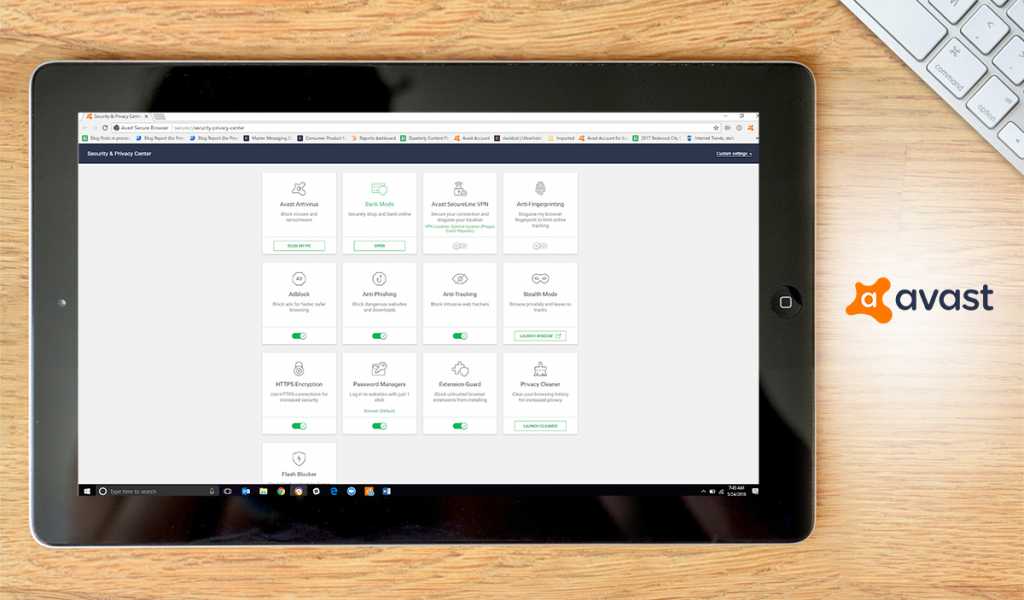
Avast Secure Browser PRO is a web browser with VPN built in. It is part of the cybersecurity suite of software produced by the Czech company Avast, a well-respected name in cybersecurity. Avast has a strict no-logging policy, which means it will never keep logs of your browsing activity or personal information.
Your online activity through this browser is fully encrypted with military-grade protection, allowing you to shop and bank online safely anytime and from anywhere. The browser has been localized to more than 30 languages, ensuring ease of use for your company’s global employees.
It also imposes no bandwidth limits, so you can surf to your heart’s content and stream unlimited media, TV shows, and movies to your device. Your web browsing is protected from infected websites, ads, and trackers by the browser’s built-in security features.
The browser has been engineered to load web pages much faster. Slow loading and access speeds are somewhat a common limitation of several VPNs, and Avast Secure Browser PRO claims up to a four-fold increase in browsing speed. It also supports a wide selection of extensions, including Google Chrome extensions.
Avast Secure Browser PRO pricing starts at $5.99/month, $2.33 /month for two years, billed at $55.99 for the first 2 years, and $3.33/month for one year, billed at $39.99 for the year. For those looking for a free version, you can download and use Avast Secure Browser for free, which has fewer features but the same level of encryption and safety.
4. Aloha Browser

Aloha Browser is a browser that has a free, integrated, and unlimited VPN that encrypts and compresses all your transactions and web browsing traffic. Its VPN service also has a no-logs policy, securing your personal and browsing data after you log off or are disconnected. Headquartered in Cyprus, it is not a member of any intelligence-sharing countries like the Five-eyes, Nine-eyes, and Fourteen-eyes alliances.
It has strong tracker protection that prevents your private data from being transferred to third parties. Aloha’s ad block feature blocks intrusive ads, making it safer to browse and faster to load web pages. In addition, without ads, the pages look cleaner and more streamlined. This also helps reduce or completely eliminate wasted mobile data usage.
Uniquely, Aloha Browser has a built-in full-featured media player with VR, allowing you to enjoy your movies and music content both online and offline. It also has a clean interface and its UI is easy to use, yet packed with features. You can use a pin code and Touch ID to quickly secure the browser while you are away or are not using it.
The Aloha browser is fast because it utilizes an optimized rendering engine developed especially for mobile devices, and its hardware acceleration capability displays pages faster. In addition, it utilizes data compression to help speed up your browsing experience.
Secure downloads are made possible by its integrated private file manager vault that helps you store your downloads securely in locked folders with passcodes or fingerprints.
It is available for free on the Apple App Store and on Google Play for Android mobile devices. For PCs, it is available on its website, with the macOS version coming soon.
5. UR Browser
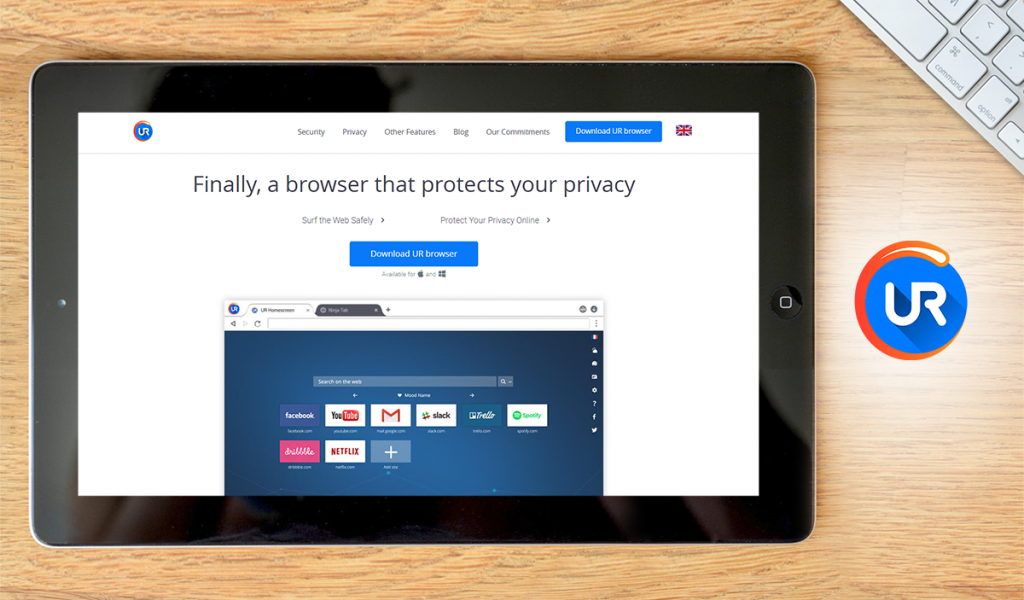
UR Browser is a secure web browser that does not track, log, or report on user internet activity and identity. It is based on the Chromium source code, but it is not open-source yet, though the company plans to eventually make its code open to the public.
Although it is still in beta testing, you can avail of its free and secure VPN feature now. Its built-in features include an ad blocker, invisible tracker blocker, third-party cookie blocker, and virus scanner, perhaps unique to this browser.
The UR VPN creates an encrypted tunnel between your device and their VPN server, so that surfing, messaging, downloading, or streaming media are all encrypted and secured from third parties. This is useful in protecting you when accessing nonsecure connections like public WiFi or mobile phone signal networks. This makes it impossible for cybercriminals and hackers to steal your personal data, passwords, or financial information, a cybercrime trend that continues to plague the internet.
UR also masks your IP and location, and by encrypting all data going from your PC to the VPN, another layer of protection is added.
Currently, in order to access the VPN, you will need to install the UR browser and then create an account on their server. Upon account validation by email, you can start using the VPN by choosing your desired geolocation from the list and connecting to the VPN.
UR browser has centralized settings for privacy levels that you can set depending on your connection and your requirements.
To protect your privacy better, the UR browser implements anti-fingerprinting protection so websites cannot use clever tracking techniques based on where you click or what displays on your browser.
Its code enables complete suppression of Google feedback beyond what is found in the browser settings, protecting you from Google’s data gathering. As we know, Google cooperates with members of the western intelligence-sharing alliances, and it is best to protect ourselves from intrusions of any kind.
It performs automatic checking of unsecured sources before connecting to the website and automatic securing of cookies sent by non-secure websites, protecting you from potentially harmful websites and tracking cookies.
6. Epic Privacy Browser

Epic Privacy Browser is a private, secure web browser with an encrypted proxy VPN available as an extension. It has VPN servers in eight countries with a strict no-logging policy, and although this is a much smaller number than most other VPNs, it is still a great deal for a free browser and VPN service.
Epic is based on Chromium source code but it has removed all Google services from Chromium to prevent browsing data from going through Google’s servers. The VPN app encrypts your data and hides your location from third parties, your ISP, and data collectors. It uses HTTPS everywhere connections and exiting the browser deletes all browser data effectively, leaving no browsing history, and keeping you safe and anonymous even after logging off.
AdBlock is an extension that blocks ads, trackers, fingerprinting, crypto mining scripts, ultrasound signaling, and other trackers that websites use to track and identify users online. This is remarkable for a free browser and VPN!
After removing access locks, you can download audio and video from hundreds of sites globally and watch streaming services from anywhere. One of its strong features is its File Vault, which encrypts the files you download to protect your privacy.
Epic uses Android’s text-to-speech support to read back web page contents to you as you travel or walk, a very helpful accessibility feature that saves on reading time. Disabling scripts for slow or unsecured sites can also be done, though this may affect page loading speed. A convenient built-in video downloader allows offline video download from many websites (except YouTube due to Google’s policies).
Epic Privacy Browser is free to download and use.
7. Mozilla Firefox
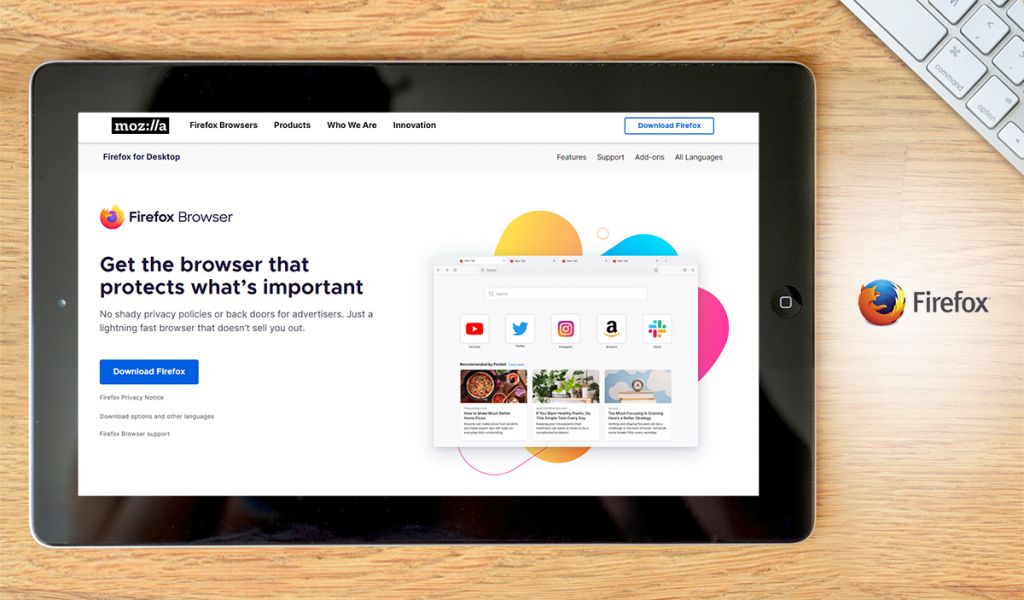
Mozilla is in the process of creating a built-in VPN for its Firefox browser, called Firefox Private Network (FPN). The much-awaited Mozilla VPN is currently available in the US, although a few countries are on a waitlist basis (you can sign up to be on their waitlist).
This makes much sense since one of the core principles of the Mozilla foundation is to ensure that privacy is enforced at all times. Principle 4 of their Manifesto states that “Individuals’ security and privacy on the internet are fundamental and must not be treated as optional.”
It has access to more than 500 servers in more than 30 countries and has device-level encryption using the most advanced WireGuard protocol. It hides your IP address and the VPN never logs, tracks, or shares any user network data. Additionally, it has no bandwidth restrictions. FPN offers military-grade encryption, public Wi-Fi protection, and IP leak protection.
You can try Firefox Private Network in the US for $2.99/month, but just remember that it is still in the beta stage. Also, it only works on the Firefox PC desktop software and there is no mobile device support yet.
8. Brave Browser
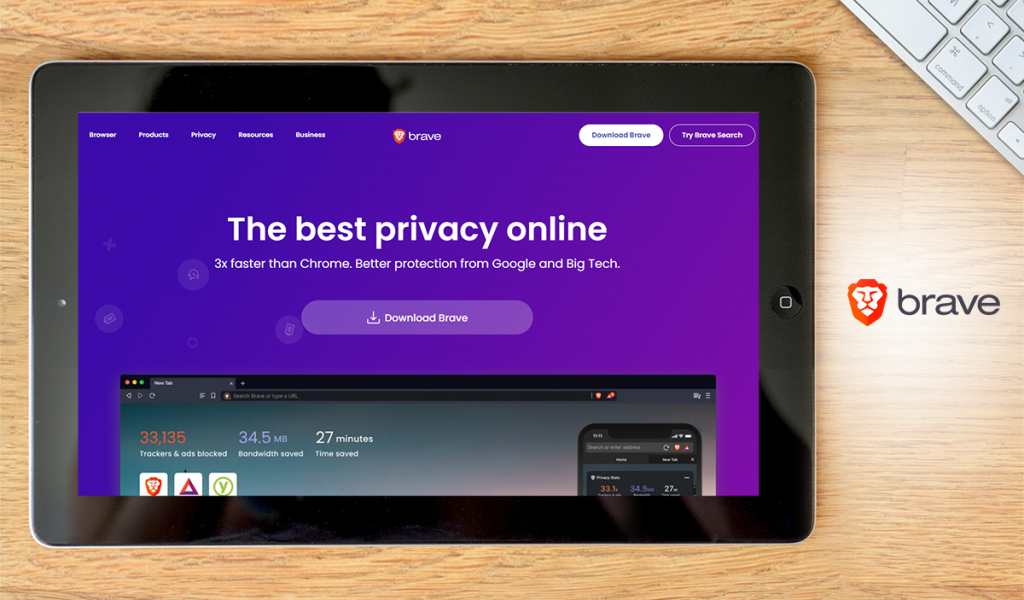
Brave is a highly secure and fast browser based on the Chromium web browser with VPN. The browser has incognito windows, which do not store anything about you in your local system once you quit the browser. It has a private search function and its own VPN for a highly-secure internet browsing experience.
Brave natively blocks Invasive ads, cross-site trackers, tracking cookies, fingerprinting by cookie-less trackers, and bounce tracking, making your internet surfing safer and more efficient. These allow you to be free from ads unknown to you that follow you across the Web. Also, no ads and trackers mean less data you download from the sites you visit, making page loads faster and saving mobile data. This helps improve your mobile device’s battery life.
You can also avail of anonymized network routing or Tor mode, which hides your actual IP address as your browsing transactions pass the Tor relay network. Websites you visit see only the final Tor relay IP address to further protect your identity online.
Brave has built-in malware and phishing protection, further protecting you from online threats to your passwords and banking information. You can further customize Brave using advanced security features like built-in IPFS integration, custom filter lists that you can set to block ads, images, requests, and scripts, and several more features.
In addition, Brave can quickly import your bookmarks, extensions, and saved passwords in only a minute, and you can set it as your default browser and enjoy browsing privacy and security not available in Chrome and other browsers.
Perhaps unique to Brave is the Brave Rewards program in which you can earn crypto tokens for your opting into privacy-preserving, first-party ads that are approved by the Brave community. The browser also provides you with your own crypto wallet, a secure, browser-native wallet that you can use to buy, store, send, and swap your cryptocurrency assets. If you’re into cryptocurrencies, this is the browser for you.
9. Psiphon
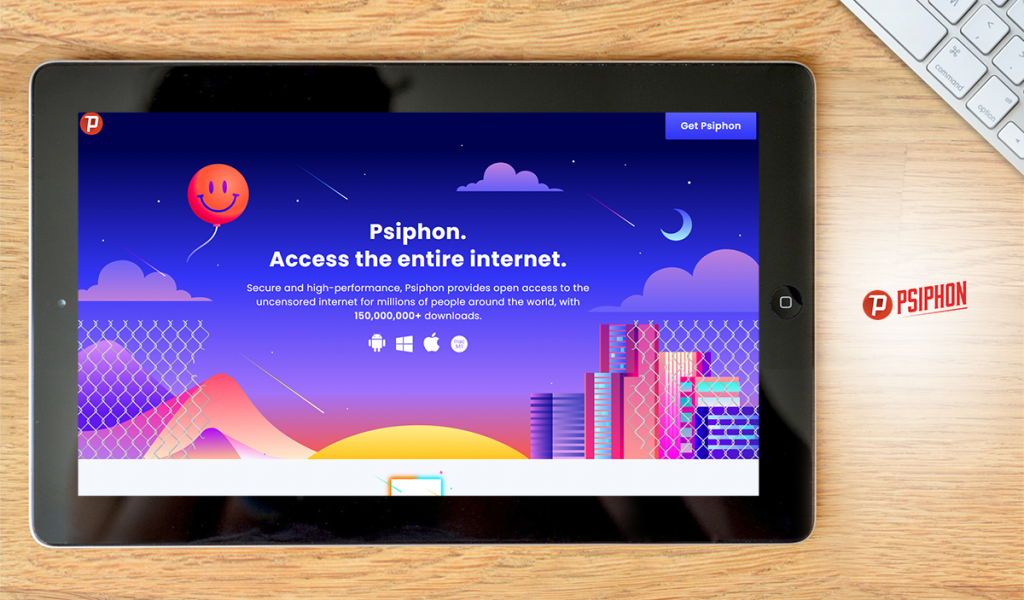
Psiphon is a free, secure, and high-performance browser with a VPN. Psiphon is open-source software built on research-driven security and network technologies. The source code is on GitHub and is frequently peer-reviewed and audited. This alone should convince people of the safety of this browser.
Its in-browser VPN utilizes a secure network of constantly-changing servers worldwide, so pinpointing your identity and actual location would be nearly impossible. The VPN employs a variety of blocking-resilient protocols, ensuring that no hacker or cyber threat will penetrate their defenses. Psiphon is designed to help you access restricted or blocked online content and services, from social media to games, and VOIP.
The Psiphon Network has an interesting live analytics dashboard showing their activities around the world. Of distinction is Psiphon’s support for people in information-restrictive environments like international broadcasters, independent media, and NGOs, which helps them access and deliver content wherever it is needed.
It is available for Android and iOS mobile devices and Windows and Mac operating systems.
The Psiphon browser with built-in VPN can be downloaded and used for free, but a subscription plan allows ad-free browsing and speed boosts. Pricing is not available at the moment. As an alternative, you can choose to earn PsiCash in-app credit tokens to spend on speed boosts to achieve maximum speed.
10. Google One
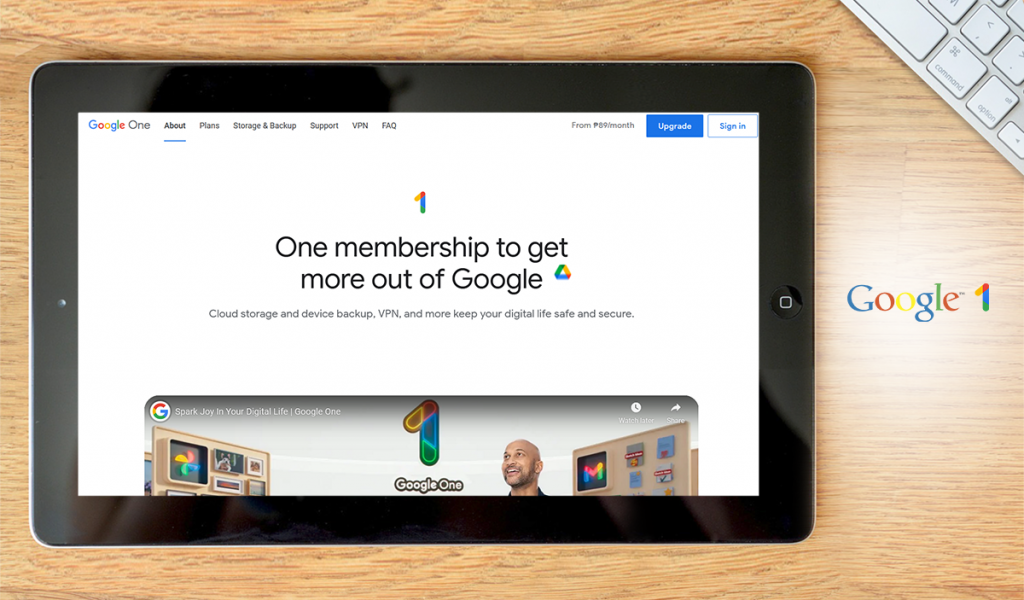
Google One is Google’s complete suite of cloud storage and VPN services, so it is not just a browser but a true VPN that protects all your devices and connections with high-grade encryption and security. With no VPN, unsecured data that you send through your browser can be intercepted or modified by hackers. With a VPN, your data travels through a strongly encrypted tunnel operated by Google’s secure global servers. Google One’s VPN can protect you against sites and apps that are outdated, weakly protected, or have no encryption at all.
By using the Google One VPN, you can eliminate illegal and harmful online tracking by hiding your IP address and shielding against eavesdropping by hackers on public Wi-Fi or unsecured networks. You can browse, stream TV programs or movies, and download content securely and privately. And you can encrypt your online activity with just one tap. A caveat is that you won’t be able to change your IP location to view content that is not available in your region, a feature not blocked in other VPNs.
It seems that Google One’s VPN data passes through “specialized [Google] servers built for specific purposes like VPN” and that Google has no access to the data.” Google has made its VPN code open-source and has had it certified and independently audited. It is encouraging that although some minimum logging is done by Google to ensure its quality of service, they are just aggregate performance data that cannot be used to identify a user. Your network traffic and real IP address are not associated with your VPN activity, the site claims.
Google’s best-in-class network architecture keeps the VPN running while maintaining a fast internet connection. For now, Google One VPN only works on Android and iOS mobile devices, with the Windows and Mac OS versions coming soon.
There’s a caveat though—it is not clear how Google’s VPN services will be affected by their legal obligations with members of the western intelligence-sharing alliances, and what user data they will share upon request if any.
Google One has several packages: 100 GB at $1.99/month billed monthly, 200 GB at $2.99/month billed monthly, and 2 TB at $9.99/month billed monthly. Annual billings are cheaper. The VPN is included for free in the 2 TB or higher plans in select countries. Google One is available only in select countries.
Bonus: Full VPNs for Systems and Browsers
Sometimes, even the best online browser with VPN isn’t enough. To take your web browsing security to the next level, consider a full VPN. It protects your entire system, not just your browser. It is important to note the difference: Browsers with VPNs protect your online activity only within that specific browser instance, while a full VPN protects all internet traffic regardless of what browser you are using and as long as it is turned on for the entire system.
VPN functionalities built into browsers are good starting points, but if you want full security and identity protection, the said browsers coupled with a full VPN would be the best combo for you. After all, it is best to protect your entire system rather than just the browser. The ten following full VPNs are highly recommended for you and your company.
1. Bright Data

Bright Data is a complete suite of apps to unblock any website and access restricted or blocked data from any geolocation. It can also be used to collect online data using a complete web data and IP proxy management platform. It can help your company obtain useful market intelligence and insights using machine learning.
Using Internet proxies and servers located globally, Bright Data allows you and your users to bypass any website location restrictions. Access to websites blocked from your geolocation is a plus, enabling you and your employees to browse and post anonymously in heavily-restricted or censored areas, especially in some of your company’s overseas branches.
The platform can be scaled up and customized as your company grows, requiring only minimum in-house resources. The VPN is enterprise-friendly, fully compliant with regulations, and has a solid and transparent infrastructure.
The VPN company offers ready-to-use public datasets or bespoke, curated datasets that are accurate and expert-verified, saving time and money on external experts. You may further customize your data collection by utilizing its web data collector to scrape vast amounts of public web data anonymously. You can program it to do these in real-time or automate it in batch mode. While normally tedious, scraping search engine results is easy to do with Bright through its SERP API. You can create your own collections of parsed search engine results automatically.
Bright Data’s proxy services include residential proxies, ISP proxies, data center proxies, mobile proxies, and advanced proxy solutions with a huge pool of available IP addresses. They have about 72 million+ residential proxies in 195 countries, around 700,000+ ISP proxies worldwide, around 1.6 million+ datacenter proxies from any geolocation, and around 7,000,000+ mobile proxies in the 3G/4G mobile network.
The mobile IP network is present in every city globally, ensuring you always have a server to connect to wherever you are physically or virtually. Its proxy manager allows you to centrally manage all proxies through one open-source interface, and the proxy browser extension manages IP addresses while browsing.
The VPN has a 99.9% network uptime rate using 100% ethically-sourced proxies in resource-sharing communities. Bright Data is fully GDPR and CCPA compliant, protecting user privacy and ensuring US and European privacy laws are obeyed online.
Bright Data has a free trial and a quote-based plan.
Detailed Bright Data Review
2. PandaVPN

PandaVPN is a fast and secure VPN that changes your virtual locations and helps you bypass website restrictions due to location. It allows you to play games, watch streaming videos, and download online media. Its more than 3,000 VPN servers in 170 locations in 80 countries ensure that you will always have high-bandwidth and low-latency server connections wherever you go.
Up to five devices with unlimited bandwidth allowance can be connected to the VPN, giving you unlimited access to music, video, social media, and streaming services from anywhere in the world. Using this VPN, all of your online activity is untraceable and 100% anonymous because of the high-grade encryption the VPN uses.
Your personal data and transactions are securely protected because your real IP address is hidden and you may browse completely anonymously using a virtual IP address.
PandaVPN’s network of ultra-fast servers utilities patented acceleration technology and ultra-fast international private leased circuits (IPLCs), point-to-point private lines that have no traffic limit, providing speeds of up to 10Gbps with no bandwidth limitations.
A very strict no-logs policy ensures that all data between applications and platforms remain completely anonymous at both ends, and your online privacy is completely protected at all times. Its highest level of ECC encryption protects all internet data exchange and transactions from any third-party snoopers.
The app is available for Windows, Mac, iOS, Android, Android TV, and Linux. PandaVPN has a free trial and several packages: 12 months at $2.77/month, 6 months at $3.99/month, 3 months at $6.99/month, and 1 month at $9.99/month.
Detailed PandaVPN Review
3. NordVPN

NordVPN is an industry-leading VPN solution that utilizes military-grade encryption—the strongest type of encryption—in protecting data and transactions online. NordVPN’s no-logs policy means it does not keep any user or browsing data on its servers. So there are no logs to speak of. Under Panama’s jurisdiction, there are no mandatory data retention laws, so users are pretty safe with this VPN. Also, being in Panama, they are not part of the Five Eyes or Fourteen Eyes intelligence-sharing alliances, which protect user data from being shared with espionage organizations.
It has several layers of protection, including DNS leak protection that prevents information leakage in domain name resolution requests to determine the IP addresses of websites you want to visit. A good thing about NordVPN is that it still maintains high-speed connections while ensuring protection. Some VPNs slow down with increased security risk mitigation, but NordVPN remains fast.
Detailed NordVPN Review
A built-in threat protection module called CyberSec blocks ads and websites known to host malware, constantly updating its blacklist of dangerous website domains to block them in real time. For advanced security, you can also use NordVPN’s double VPNs, routing your internet traffic through two VPN servers instead of one for double encryption of your data; this might slow down the overall connection speed, though.
NordVPN supports P2P sharing, increasing your options for finding specific files or data. Additionally, NordVPN’s Kill Switch prevents unprotected access to the internet when you lose connection to a NordVPN server. This makes sure you are only using NordVPN’s secure browsing at all times, with no leakage to other sites.
You can also use the Tor browser and VPN software together, known as Onion over VPN, which provides an additional layer of encryption first through a VPN server before being relayed to the Tor Network. For financial transactions, NordVPN accepts cryptocurrency payments, and secure and anonymous blockchain payment systems, a growing mode of payment worldwide.
It is available for all smartphones, laptops, tablets, PCs, and home routers.
NordVPN has a free trial and several packages: Simple at $11.95/month, Best Offer at $3.29/month (2-year plan), Standard at $5.75/month (1-year plan), and NordVPN for Business, available by quotation.
4. ZenMate

ZenMate ZenMate is a VPN platform from Germany. It allows you to connect to and access VPN servers from various geolocations, with end-to-end encryption between your devices and the VPN servers. It has a no-logs policy that purges all your data and browsing history upon disconnection from the VPN host server. None of your data or browsing histories is stored on its servers.
ZenMate allows you to hide your true IP address from the internet, your ISP, and the websites you visit. High-grade encryption ensures that your data is undecryptable both ways, ensuring absolute privacy, safety, and the ability to bypass censorship in certain countries.
Detailed ZenMate Review
ZenMate has malware and tracking blockers that automatically block potentially dangerous websites, giving you an additional layer of protection as you browse all types of websites.
The number of VPN server locations it utilizes is around 80 servers globally. This gives you much flexibility in choosing countries or geolocations to browse from. These servers can also be accessed via their VPN Chrome or Firefox browser extensions.
Unlike some other VPNs, Zenmate VPN still keeps its fast speeds for internet connections worldwide. ZenMate VPN allows for the protection of an unlimited number of devices. It is available for Windows, Mac, Android, iOS, and as a browser extension, ensuring your privacy on any device.
ZenMate VPN has a free trial and several packages: Monthly billing at $8.99/month, a six-month plan at $7.49/month, and an annual billing at $4.99/month.
5. ExpressVPN

ExpressVPN is an easy-to-use and stable VPN solution for personal and company use. It has over 145 servers located in 94 countries and provides unlimited bandwidth. ExpressVPN boasts of a 99.99% server uptime, ensuring constant and uninterrupted service wherever you are. The servers do not keep any activity logs, ensuring user privacy and anonymity.
It allows three simultaneous connections at the user’s end, and unlimited server switches are allowed in difficult places where connections might not be constant or reliable. The servers utilize best-in-class encryption, and various encryption protocols are supported by the platform, including OpenVPN, L2TP-IPsec, SSTP, and PPTP.
Detailed ExpressVPN Review
Additionally, it has split tunneling capability so your organization-specific traffic is routed through the VPN tunnel and other traffic through the remote user’s default gateway. The service’s kill switch makes sure that all traffic goes through the VPN servers at all times; whenever this is not possible, the VPN stops sending data to other servers, serving as a true kill switch.
ExpressVPN also has zero-knowledge DNS, meaning your DNS queries for web host resolution are run through the VPN service’s own encrypted VPN DNS server. There are no activity logs and no connection logs kept, ensuring complete privacy and anonymity.
All major platforms and device operating systems are supported by the service. It has 24/7 customer support, ensuring constant and reliable help wherever you are.
ExpressVPN has a free trial and several packages: the Monthly plan at $12.95/month, the 6-month plan at $9.99/month, and the annual plan at $8.32/month.
6. Cisco AnyConnect

Cisco AnyConnect is a VPN that is part of Cisco’s set of security applications and agents. It performs multiple security services to protect organizations and their users online. Users can connect to the VPN quickly and easily, and it does not require a lot of maintenance.
AnyConnect VPN/ZTNA is a powerful and industry-leading component that helps IT and security professionals manage dynamic and scalable endpoints in your organization’s security loop as part of the Secure Client module. Instead of just a single app, it utilizes multiple endpoint security agents to protect your users and company traffic at all times. Cisco AnyConnect allows remote users to access private applications from anywhere.
Detailed Cisco AnyConnect Review
A single cloud management console enables you to see all your security agents on one screen. Analytics apps allow you to monitor every endpoint application usage by all users. It monitors user behaviors and potentially harmful events, both on and off-site. Harmful spam emails and attachments, common sources of intrusion and data loss, are blocked by its advanced security apps.
The Cisco Secure Endpoint module working together with Cisco AnyConnect provides advanced endpoint protection across control points, making your business safer from threats. Cisco’s Umbrella Roaming module utilizes cloud-delivered security to protect your users offline and when they are disconnected from the VPN.
Cisco AnyConnect has a free trial and a quote-based plan.
7. hide.me

hide.me is a free and powerful VPN that is ad-free. One-click connections make it easy and convenient for you and your company users to use the VPN software. Its more than 30 server locations worldwide make for a wide range of choices of server geolocations no matter where you are.
To ensure safety when offline or disconnected from the VPN, it has a kill switch feature that automatically disconnects internet access to non-VPN sites. This automatically protects you from accidentally connecting to non-secure and possibly dangerous sites. It enforces IP and DNS leak protection to prevent hackers from snooping on your company or personal IPs and websites visited.
Detailed Hide.me Review
hide.me uses strong data encryption as a standard technical capability, pretty common among all VPNs. It has zero activity logging even in the free version. It provides a smoother experience on unstable connections as it automatically makes connection adjustments transparently.
The VPN’s server network has a 99.99% uptime rate, a pretty good rate in the industry. Its VPN has been audited by independent third-party security analysts and has passed the standards for modern internet connections and online activities.
The program can be used in trial mode, without the need for full signup. hide.me has a free trial and several packages: the Free package, Premium at $9.99/month, and Plus at $4.99/month.
8. Norton Secure VPN (Norton WiFi Privacy)

Norton Secure VPN, formerly Norton Secure WiFi Privacy, is a powerful industry-standard VPN that protects user data sent and received via WiFi hotspot connections. It is part of the Norton 360 Security suite that covers all aspects of online security and privacy. Norton WiFi Privacy does not keep any user logs on its servers due to a strict no-logging policy, ensuring security and privacy for its users.
The program suite includes multi-device security solutions and a secure VPN. A strong password manager and cloud backup service also act in concert with the VPN service. The VPN uses bank-grade encryption in all transactions, ensuring total security and privacy of all user activities.
Norton WiFi Privacy allows for the unblocking of restricted websites in certain countries, enabling users to browse content from any website globally. The app also has an ad-blocking option to save on distractions and bandwidth and to protect against risky ads or injectors.
The software can counteract and bypass content-locking rules set by restricted websites, enabling full browsing of these sites for your users and organization. This is automatically and transparently run by the app in the background as you browse the internet anonymously.
Norton WiFi Privacy has a free trial and three packages: 1 Device for $4.99/month, 5 Devices for $7.99/month, and 10 Devices for $9.99/month.
9. CyberGhost

CyberGhost is a robust VPN service that allows users to access restricted content with complete anonymity. It protects online users by allowing them to surf the internet safely and anonymously. IP address hiding and changing are done by the program automatically, CyberGhost has a no-logs policy, which means it does not store any user or transaction data history on its servers. As it has no data logs to show, the security of all transactions and conversations is ensured for all VPN users. It has many global servers in its network that can serve as your access point, giving you many options on geolocation or virtual IP addresses.
Detailed CyberGhost Review
Protection is applied regardless of platform, allowing you to use any device to access WiFi hotspots and browse the web. CyberGhost VPN has browser plugins available to most browsers, making it easy to install and use the VPN.
The platform’s WiFi protection utilizes end-to-end robust encryption, ensuring safe and secure browsing even from public hotspots, which are frequently insecure and risky. Additionally, the program can block online trackers’ track requests, increasing privacy and anonymity as you browse the internet.
CyberGhost VPN has an ad-blocking feature to save you time and bandwidth. It also protects users from dangerous redirect URLs or ad malware injectors. In addition, automatic malware blocking protects your devices and network from harmful programs and threats.
CyberGhost has a free trial and four packages: 1 Month at $12.99/month, 6 Months at $7.99/month, 12 Months at $5.25/month, and 18 Months at $3.50/month.
10. Avast SecureLine

Avast SecureLine is a secure and robust VPN that is part of the Avast suite of programs for cybersecurity and antivirus protection. Avast is a well-known and well-respected name in the cybersecurity industry. The VPN software ensures the safety and online privacy when using public hotspots.
Avast SecureLine was built and developed on the open-source software protocols OpenVPN and OpenSSL, which are very reliable and transparent. The VPN software utilizes 256-Bit AES encryption or bank-grade encryption, ensuring high security for all internet traffic.
Detailed Avast SecureLine Review
Avast SecureLine can mask user identity by using a single shared IP, enhancing user privacy and making it impossible to identify the user from all aggregated IP address activities. DNS leak protection prevents hackers or snoopers from seeing DNS lookups to DNS servers, keeping the website addresses you visit private and known only to you.
Along with content unblocking, you can avail of media streaming and fast downloads of your favorite shows, movies, and games. P2P support is also available in the VPN, adding other sources of data from peer-to-peer networks. This increases the availability of rare or hard-to-obtain files.
Avast SecureLine has a free trial and several packages: Up to 5 Devices with a $79.99 annual billing, PC with a $59.99/annual billing, Mac with a $59.99/annual billing, Android with a $19.99/annual billing, and iPhone or iPad with a $19.99/annual billing.
Browsers, VPNs, and the Future
An important topic we need to talk about is OpSec or operational security. People can still get caught not due to lapses in browser or VPN security, but rather due to failures in OpSec. An infamous case is that of a Harvard student who e-mailed a bomb threat via the Tor network using an anonymous Guerrilla Mail e-mail address. The FBI caught the suspect by just looking at the logs of Tor wireless access within the campus and matching it with the e-mail’s header IP and time stamps (the suspect confessed after questioning).
In short, there are some indirect ways to track you irrespective of how secure your browser and VPN are. So whatever you decide to do, make sure it is not illegal and that you secure your activities carefully. Browsers and VPNs can give you reasonable security, but actions outside of their scope of functions can still reveal your IP address, timestamps, and activities, which can be used to deduce your identity online.
Related to this, a recent study found that many VPN providers misrepresented the physical location of their servers. 10% of the providers studied had 5–30% of their server vantage points appearing to be hosted on servers located in countries other than those advertised to users. Maybe this is not a deal-breaker, but it indicates a potential source of distrust.
Web 3.0 is rapidly approaching, with decentralization as its key concept. It involves blockchains, nodes, cryptocurrency, e-wallets, and AI. Bottom-up design of apps and programs, as opposed to the current practice of writing and controlling code centrally by a small group of experts, is its core paradigm. In fact, the cryptocurrency market growth has been steady and is projected to have a CAGR of 30% by 2026.
Currently, a few companies are technocracies that essentially control our internet experience. Web 3.0 promises to decentralize platforms and put more power in the hands of users and content creators. VPNs and web browsers with VPNs will definitely help usher in this new evolution of the web.
As browsers and the internet are critical components of modern life, we have to be vigilant about the browser trends that affect our use of the internet.
For that, we have to take stock of the latest browser statistics that matter to us.
Meanwhile, we highly recommend the use of Bright Data VPN to ensure safe online activities anytime, anywhere. You can always see how the app works by availing of its free trial offer.
How can you enhance your VPN security beyond basic usage?
While a VPN can offer enhanced privacy, users can further safeguard their browsing experience by taking additional steps to maximize security.
- Use Multi-Factor Authentication (MFA): Enable MFA wherever possible to add a layer of security beyond your VPN login. This extra step can help keep your account secure, even if login credentials are compromised.
- Avoid Free Public Wi-Fi: Even with a VPN, public Wi-Fi networks pose security risks. Connecting only through trusted, secured Wi-Fi or using a personal hotspot is a safer option.
- Regularly Update VPN Software: Ensure your VPN software is updated to benefit from the latest security patches and enhancements. Outdated versions may be vulnerable to new cyber threats.
- Disable Location Services: Prevent your device from sharing location data by turning off location services in device settings. This helps minimize tracking by apps and websites.
- Combine VPN with Encrypted Messaging Apps: For maximum privacy, use encrypted messaging apps alongside VPNs to ensure that conversations remain secure even if one layer of security is bypassed.
Taking these measures, in addition to using a VPN, can help ensure a more secure and private online experience.
Key Insights
- Increasing VPN Usage: VPN usage surged during the COVID-19 pandemic, with significant increases in countries like Italy (160%) and the United States (124%), highlighting growing concerns over privacy and security.
- Privacy Concerns: The rise in VPN adoption is driven by increasing awareness of privacy issues and the need to protect personal data from espionage and cybercrime.
- Tor Browser for Anonymity: Tor Browser stands out for its robust anonymity features, making it ideal for journalists, activists, and individuals needing high levels of privacy.
- Integrated VPN Browsers: Browsers like Opera and Avast Secure Browser PRO offer built-in VPNs, providing seamless and secure browsing experiences without additional software.
- Full VPN Services: Full VPNs like NordVPN and ExpressVPN offer comprehensive protection for entire systems, not just browsers, ensuring all online activities are secure.
- Geolocation Flexibility: VPNs provide the ability to bypass geographical restrictions, enabling access to content and services globally.
- Corporate Use: Companies utilize VPNs for secure data access, anonymous competitor analysis, and safeguarding sensitive information across distributed teams.
FAQ
- Why should I use a VPN with my browser? Using a VPN with your browser enhances your online privacy and security by encrypting your internet traffic, hiding your IP address, and protecting against cyber threats.
- What is the best browser with a built-in VPN? Opera and Avast Secure Browser PRO are among the top browsers with built-in VPNs, offering robust security features and seamless integration for a secure browsing experience.
- How does Tor Browser ensure anonymity? Tor Browser routes your internet traffic through multiple relays, masking your IP address and encrypting your data, making it difficult for anyone to trace your online activities.
- What are the benefits of using a full VPN service? Full VPN services protect all your internet traffic, regardless of the browser or device you use, providing comprehensive security and privacy for all online activities.
- Can VPNs bypass geographical restrictions? Yes, VPNs can mask your IP address and make it appear as if you are browsing from a different location, allowing you to access geo-restricted content and services.
- Are there free VPN browsers available? Yes, browsers like Tor and Epic Privacy Browser offer free VPN services, though paid options like Avast Secure Browser PRO and Opera VPN Pro provide additional features and better performance.
- How does a VPN protect against cyber threats? VPNs encrypt your data, making it unreadable to hackers and cybercriminals, and often include features like malware and ad blockers to protect against online threats.
- Is it safe to use a free VPN service? While some free VPN services are reliable, they may have limitations in terms of speed, data allowance, and server locations. Paid VPN services generally offer better security, performance, and features.
- What should I look for in a VPN service for my business? For business use, look for a VPN with strong encryption, a no-logs policy, multiple server locations, high-speed connections, and additional features like dedicated IP addresses and multi-device support.
- Can VPNs be used on mobile devices? Yes, many VPN services offer mobile apps for iOS and Android devices, allowing you to secure your internet connection and protect your data on the go.


























Leave a comment!